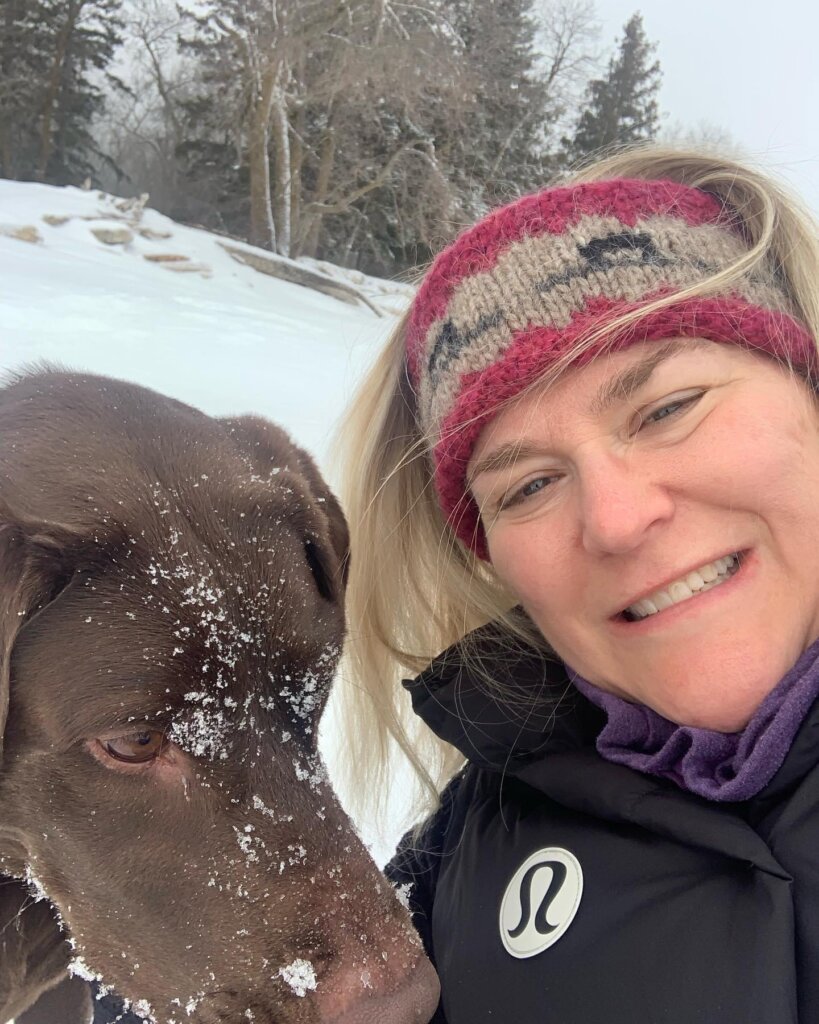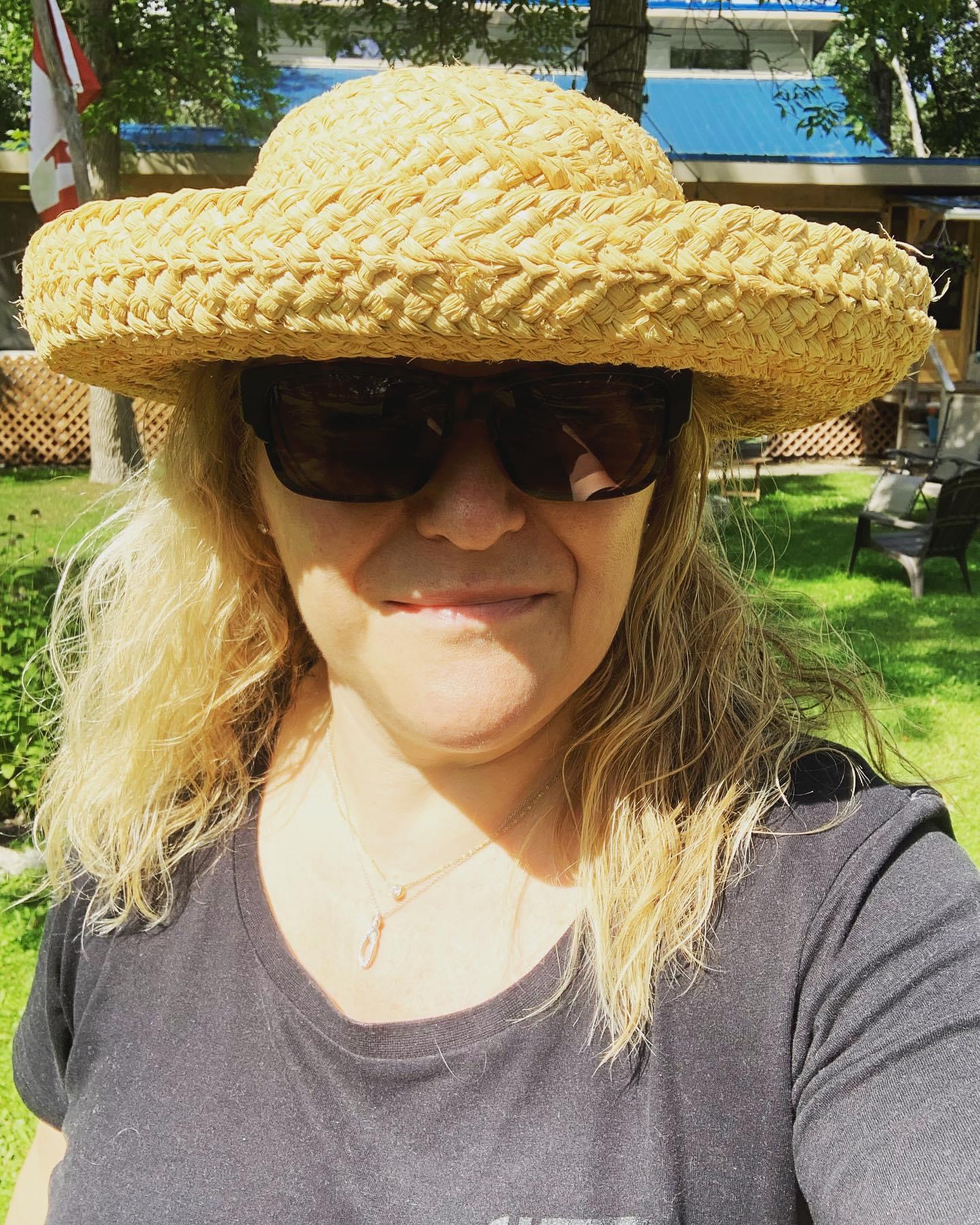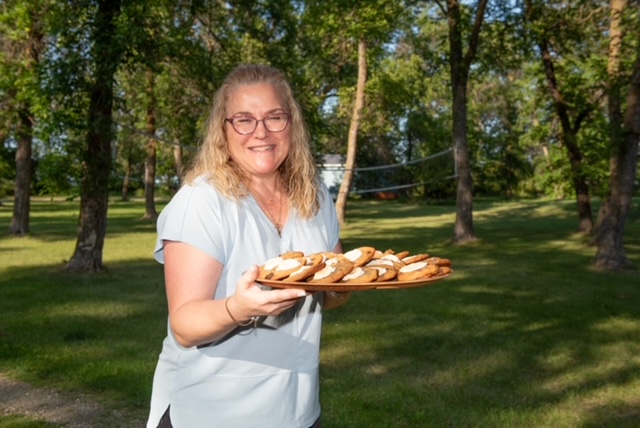
Sights Set on Recovery
Tracy Leipsic has always lived an active life. A speedskater in her youth, she’s stayed connected with the community as a Speedskating Manitoba board member and an official with speedskating in Canada, and as a mom to a next-generation speedskater (her son, Adam, has taken up the sport). She works out regularly, continually challenging herself to push her physical limits. She’s also raised three children, who are athletically and academically inclined, supporting them in their many endeavours through the years.
Along with Adam, who is a first-year university student and athlete in the Olympic Oval program at University of Calgary, Tracy and her husband of 27 years, Richard Buchwald, have identical twin daughters. Serena, a former student-athlete who was on her U.S. university’s swim and dive team, earned a Bachelor of Science degree in neuroscience and a Master’s of Public Health degree, specializing in brain, behaviour and the environment. Rachael recently graduated with distinction from the Rady Faculty of Health Sciences at the University of Manitoba with a Bachelor of Health Studies.
Tracy, who’s spent her career in the insurance world and served on several other boards and committees through the years, finds her downtime by relaxing at the family cottage, reading, and cooking.
“I don’t cook with recipes,” Tracy says, sharing her family’s excitement over her traditional Hannukah dishes. She keeps a fresh batch of homemade hummus in the fridge and tells of the banana blueberry loaf she brought along on a recent visit to see her son in Calgary.
“I use whatever I’ve got in the house,” she says. “I just like to have fun in the kitchen.”
Feeling less like herself
The summer of 2023 started like any other, with Tracy taking part in her usual activities, until she began to get hints that something wasn’t right.
She’d just helped her son move to Calgary and was feeling less like her energetic self.
“I thought, well, I drove 26 hours in two days,” she says, “of course I’m tired.”
Then, she found she didn’t have much of an appetite in the mornings. Using it in her favour, she thought she’d try the intermittent fasting she’d heard about from friends.
The strange, “fuzzy” feeling in her left eye came next. Even though she wasn’t due for an eye exam for several months, Tracy called her eye doctor to book an appointment.
“I thought to myself, ‘I’m being so proactive and taking care of myself,’” Tracy says.
When the feeling persisted, Tracy called her eye doctor back to request an earlier appointment. The day she was to see the eye doctor, Tracy went to the gym and recalls how out of sorts she felt.
“My warm-up, which would normally be easy for me to do, may as well have been 5,000 pounds,” she says. “I remember looking in the mirror at myself and thinking, ‘That is not me. I don’t know who that is.’”
Finding the cause
Piecing together that her recent challenges were likely related, Tracy was eager for answers. At the eye doctor, as she was going through initial testing, she was asked how her day was going.
“I just looked at her and said, ‘Not good, but that’s why I’m here,’” Tracy says.
She struggled with the testing, unable to see much of what was on the display. Tracy learned that she’d lost most of the vision in her left eye, while the vision in her right eye had also declined.
The eye doctor pushed through an urgent referral to an ophthalmologist, who agreed to see Tracy the next morning. Within 20 minutes of her ophthalmologist appointment, Tracy says she felt as though “the air got sucked out of the room.”
She’d undergone test after test, with the ophthalmologist again referring her on, this time for an MRI.
She had plans to spend the weekend at her cottage with friends, so that’s where she headed after her appointment. The next morning, the ophthalmologist reached out to her to see if she had her MRI yet.
She hadn’t, not realizing it was to happen so quickly. Tracy was then scheduled to have her MRI that day.
“Had the ophthalmologist not called, I wouldn’t have had the MRI done,” she says.
She left the cottage, had her MRI, and drove back to the cottage. As her friends were enjoying an evening fire, Tracy realized she’d missed a call from the ophthalmologist.
“I knew he wasn’t calling at 10:45 on a Saturday night just to say, ‘Hi,’” says Tracy.
Next steps
 The ophthalmologist called again the next morning, breaking the news that Tracy had a large pituitary tumour that was likely benign. Tracy was relieved to hear there wasn’t an aneurysm present, given her family’s history of aneurysms, though she was told her tumour was significantly larger than there was space for.
The ophthalmologist called again the next morning, breaking the news that Tracy had a large pituitary tumour that was likely benign. Tracy was relieved to hear there wasn’t an aneurysm present, given her family’s history of aneurysms, though she was told her tumour was significantly larger than there was space for.
While she awaited a follow-up call from the neurosurgery clinic, Tracy tried to avoid doing her own research. She kept busy with family, having two of her children in town at the time. Her husband, who was set to fly to Miami for their daughter’s graduation the next day, was hesitant to leave Tracy’s side.
“I said, ‘This is her master’s graduation and she’s getting a Dean’s Award of Excellence,’” Tracy recalls. “‘You’re going.’”
Tracy notes the irony in that their daughter, Serena, was to graduate with a focus on neuroscience and brain behaviour, only three days after she’d been diagnosed with a brain tumour.
“We joke now that clearly we knew she was going to be bored, having graduated with her master’s degree,” Tracy says, “so I got a brain tumour to keep her busy.”
When Richard returned home from the graduation on Wednesday, he and Tracy then began the process of telling their family about her tumour.
“My vision was going downhill pretty quickly,” Tracy says. “I had a lot of micro-deficiencies. The tumour grew so quickly that my body struggled to adjust to what was going on.”
Her consultation with the neurosurgery clinic was scheduled for Thursday, exactly one week after her eye exam.
“I thought a consultation meant, ‘Oh, we’re going to explain this, and here’s the plan for the next several weeks or months,’” Tracy says.
She was told she had a non-secreting pituitary tumour that was nearly three centimetres in size and compressing her optic nerve and carotid artery. She was also told she’d be admitted to the hospital immediately, where she’d have further testing done and surgery to remove her tumour as soon as possible.
“‘They said, ‘Right now, we’re doing surgery to save you, whereas if we wait, the surgery would potentially be more about the quality of your life,’” Tracy says. “I really did trust the process. There wasn’t time to discuss whether it was the right choice.”
Surgery and recovery
Tracy describes the chaos that ensued over the next several hours, from having to notify her workplace to having to update her healthcare directive, all while her son had to pick up her daughter from the airport as she was moving back home that day.
“That would happen to be the date she was moving home, after five years away,” Tracy laughs. “As a parent, I conveniently did this when everybody would be home.”
She had a five-hour transsphenoidal (through the nose) surgery the next day, which was reasonably successful. Most of the tumour was removed, though a small portion around the carotid artery was left remaining.
Tracy was comforted by the familiar face of a good friend, an anaesthesiologist, who stopped by to see her before and shortly after her surgery. The surgeon had just called her husband with an update, when her friend gave him a call with a more personal update.
“He said, ‘Hey, I just want you to know your wife looks great,’” Tracy recalls. “Richard couldn’t be there as it was past visiting hours, so we thought, aren’t we fortunate that our good friend was able to do that? Nobody asked him to. It was the sweetest thing.”
The next morning, Richard and their children were able to visit Tracy in shifts.
“By noon, I started to feel like a 747 was on my head,” Tracy says. “I’d never in my life felt pain like that. I couldn’t open my eyes to light. The doctors explained that because the optic nerve and the carotid artery had been so compressed, there was now blood flow, which was as though I had a cramped muscle that had been released.”
Her pain gradually turned to discomfort, which she says was manageable. She wasn’t able to lay down flat and would have to take time to adjust when going from sitting to standing. She describes light and movement as being “overwhelming” to her, and says simple tasks like walking were a challenge.
“It was very bizarre to have been working out a couple weeks before, when I couldn’t walk 50 feet without feeling like I’d just run a marathon,” she says.
Tracy kept a journal detailing her experience, where she noted her feelings two weeks post-surgery.
“All eyesight has returned but I’m ridiculously sensitive to light,” she wrote. “My balance is back, but not steady. My head feels like it has bad Wi-Fi with slight delays if I move too quickly, but all things considered, I’m so happy to be alive and recovering.”
A new normal
 Through plenty of rest and recovery time at her favourite place, the cottage, Tracy has been able to find what she calls her “new normal.”
Through plenty of rest and recovery time at her favourite place, the cottage, Tracy has been able to find what she calls her “new normal.”
Her energy levels are not what they used to be. She has memory issues, pointing out that her love of reading has had to take a backseat to her recovery as she can’t recall what she’s read after only a few pages. Her sense of smell and taste are not what they used to be, which has required follow-ups with an ear, nose and throat (ENT) surgeon. She’s also experienced nausea, particularly around flickering lights, and stress and headaches that ensue when she’s tried to take on too much at once.
“I think it’s deceiving because I look fine, but I’m not fine,” Tracy says. “It’s odd how much more sensitive my body is to my surroundings, and how I need to listen to my body for a positive recovery.”
She’s been doing rehab at the gym, which has returned some normalcy to her life.
“Getting my balance and my strength back has helped,” Tracy says. “It’s helped physically, but it’s also helped emotionally.”
Tracy’s finding balance in other ways, too, learning to manage the hours in a day where she has energy for her tasks, her gym and work schedules, and her time with family and who she calls her “diva of a chocolate lab,” Bailey, while allowing herself to heal.
“One of the biggest lessons I’m trying to live by is to be kind to myself and my recovery.”
Another lesson this experience has taught her? Trust your gut.
“Don’t hesitate with your health,” Tracy says, “and if you think something isn’t right, act on it. Had I hesitated at all and not called the eye doctor back to ask if I could see her in the next few days, everything would be different.”
Learning to live with it
The remainder of Tracy’s tumour is, thankfully, not causing further issues at this time. A recent MRI showed it “sitting pretty around the carotid artery,” Tracy says.
“I’m just now learning to deal with living with a tumour, the anxiety of this and the trauma of immediate neurosurgery to save my life,” she adds.
Having been unfamiliar with brain tumours prior to her own experience, Tracy connected with Brain Tumour Foundation of Canada in her recovery as she searched for resources and community.
“I’ve felt lost in this sudden change in my life, and yet have felt nothing but supported and comforted by all aspects of the Foundation,” she says. “It helps to know that we are not alone in this crazy journey. If telling our stories gives comfort to one other person, then it’s all worth it.”
Tracy would like to acknowledge those who have helped her through her journey:
I am extremely grateful and thankful for the amazing staff at the RINK Testify Performance gym, where the trainers and programming system track your daily workouts. If I had not been able to see the decrease in my weight loads, I don’t know if I would have reacted as quickly.
I’d like to extend my thanks to my eye doctor, Dr. Caitlynn Keech at Oakley Optical. Her willingness to fit me in, as I was just feeling off, was appreciated. She pushed for an immediate ophthalmology exam and thank goodness she did.
Thank you to Dr. John Van Der Zweep at the Misericordia Health Centre’s Eye Care Centre of Excellence for the extensive exam the day after my eye doctor appointment and for his calm and comforting demeanour, as it became clear during the exam that something was quite wrong. It couldn’t have been easy for him to call me so quickly after my MRI with terrible news, but he took the time to explain things and reassure me.
I’d also like to thank everyone at the Health Sciences Centre’s neurosurgery clinic. They were truly exemplary in helping me through my journey.